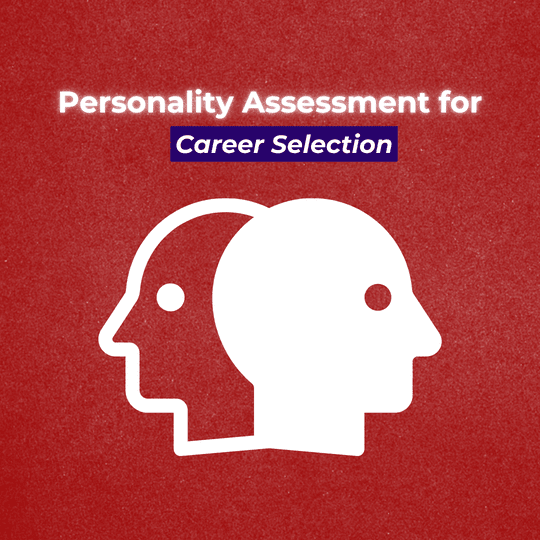CATEGORIES
#Careers #Education and Life SkillsOverview:
- Personality assessments align careers with individual
- Tools like MBTI and Big Five guide choices.
- Combine assessments with mentorship and experiences for a better career path.
Making this decision requires a thorough understanding of your personality. How you relate to others, manage stress, and tackle obstacles at work is influenced by your personality traits. Your professional journey can be more successfully navigated if you comprehend the relationship between personality and career choices. Finding a path that genuinely fits your tastes and strengths is made easier by this.
In this decision-making process, knowing your personality is essential. Your personality directly impacts how you deal with stress, tackle problems at work, and engage with others. You can more skillfully navigate your professional path by comprehending the relationship between personality and career choices.

The Importance of Career Selection
Finding direction and clarity in your life goals is key to selecting a career. A carefully thought-out career path provides opportunities for advancement, financial stability, and personal fulfillment. When your work aligns with your interests, values, and abilities, you do meaningful and fulfilling work. This alignment fosters motivation, satisfaction, and a sense of purpose, helping you succeed in your chosen field.
A well-considered career choice can also lead to promotion and professional growth. As your career develops, you expand your network and gain valuable experiences. These experiences help you acquire new skills that enhance your employability. Therefore, making this choice carefully is essential for a successful and rewarding journey.
Personality Traits and Career Choices
Navigating a career path can be overwhelming. While some skills and qualifications are essential, understanding your personality is equally crucial for success. Your personality traits significantly affect your job satisfaction and success in various roles. Let’s explore how personality influences career choices. Different traits can guide you toward opportunities that offer greater satisfaction and success.

The Big Five Personality Model
Psychologists frequently refer to the Big Five Personality Model when studying variations among individuals. This consists of the following characteristics: Willingness to try new things, Thoroughness, Sociability, Friendliness, and Emotional stability, often shortened to OCEAN. Each characteristic offers valuable insights into how individuals can succeed in various work settings.
Openness to Experience: People with high levels of openness are usually inquisitive, imaginative, and flexible. They thrive in environments that promote creativity and continuous learning, making them ideal for professions in research and arts.
Conscientiousness: Individuals who possess high levels of conscientiousness exhibit traits such as being organized, responsible, and detail-oriented. Structured environments are where they excel, so careers such as accounting,management, or engineering are ideal fits for their skills.
Extraversion: Extroverts derive energy from social interactions and thrive in collaborative settings. Their ability to communicate effectively and sociable nature make them well-suited for positions in sales, marketing, or public relations.
Agreeableness: Individuals who possess high levels of agreeableness are known for being understanding, collaborative, and focused on working effectively. They excel in careers that require teamwork and forming connections, like human resources, social work, or customer service.
Neuroticism: People who have elevated levels of neuroticism may experience increased emotional sensitivity. They frequently exhibit strong perceptiveness and a focus on details. Lastly, they excel in positions that involve meticulous observation and analysis, like quality control, editing, or specific research roles.
Understanding Personality Assessments
What Are Personality Assessments?
Tools for measuring and analyzing different facets of a person’s character and psychological makeup are called personality evaluations. They usually comprise a set of inquiries or declarations that reveal characteristics, actions, and inclinations that influence personality.
How Do They Work?
These tests are predicated on the idea that people have unique personality traits that shape their beliefs and behaviors. The tools classify people into particular personality types or profiles by examining their responses. The revelations show how an individual interacts with their surroundings, makes choices, and interacts with others. Finding appropriate career paths requires this.
Benefits of Personality Assessments in Career Selection
Self-Awareness
The improvement of self-awareness is one of the essentials of personality tests. You learn a lot about your strengths and shortcomings by analyzing your personality traits. By utilizing your abilities, this helps you understand and assists you in making well-informed job selections. Additionally, it strengthens your weak areas, which increases your rate of success in a workplace.
Career Alignment
When it comes to matching your professional choices with your innate preferences and tendencies, personality tests are essential. By determining appropriate settings and positions, you can select a career path that optimizes your abilities. Your professional life will be more fulfilling and satisfying as a result of this alignment.
Enhanced Job Satisfaction
You’re more likely to be satisfied with your work when you pick a career that suits your personality. You are likely to enjoy your responsibilities when you work in an environment that compliments your natural character. A strong sense of purpose is also satisfied by it.
Additional Benefits
- Improved Interpersonal Relationships: Being aware of your personality will help you communicate with clients and coworkers more effectively.This will promote cooperation and better relationships.
- Informed Decision-Making: Personality tests offer a framework for choices pertaining to professional advancement.
- Resilience and Adaptability: Understanding your personality qualities will help you become stronger when faced with difficulties. Further helping you deal with stress at work.
- Career Advancement: You can find prospects for professional growth and promotion by having a better awareness of your personality.
Popular Personality Assessments for Career Selection
Many personality tests might offer insightful information when it comes to selecting a job route. An outline of some well-liked tests that aid people in comprehending their personality qualities can be found here. These characteristics have a big impact on professional decisions.
Myers-Briggs Type Indicator (MBTI)
One of the most well-known personality tests is the Myers-Briggs Type Indicator (MBTI). It uses four dichotomies to divide people into 16 different personality types:
Comparing Introversion (I) and Extraversion (E)
Intuition (N) versus Sensing (S)
Feeling (F) against Thinking (T)
Perceiving (P) versus Judging (J)
People can learn more about their preferred working habits, shortcomings, and strengths by determining their personality type. For example, an INFP may flourish in artistic or compassionate professions, but an ENTJ may flourish in leadership positions.
Big Five Personality Traits
The Big Five Personality Traits model, also known as the OCEAN model, assesses individuals across five core dimensions:
- Openness to Experience
- Conscientiousness
- Extraversion
- Agreeableness
- Neuroticism
This model is highly regarded in psychological research for its validity. Understanding where they fall on each of these dimensions helps individuals identify careers aligning with their traits. For example, a person high in conscientiousness may find fulfillment in roles requiring attention to detail.
Holland Code (RIASEC)
Six personality types are used by the Holland Code, commonly referred to as the RIASEC model, to classify careers:
-
- Investigative (I),
- artistic (A),
- social (S),
- entrepreneurial (E),
- realistic (R), and
- conventional (C)
People might investigate employment possibilities that fit with their interests and values by identifying their dominant personality types.
Strengths Finder
Instead of focusing on personality traits, StrengthsFinder (now CliftonStrengths) recognizes each person’s distinct talents. 34 distinct strengths are identified by the exam and categorized into four domains:
Putting Influential Relationships into Practice and Developing Strategic Thinking
For example, a person influencing a domain might do well in positions involving public speaking.

Integrating Personality Assessments with Other Career Selection Tools
Using Assessments Alongside Skills and Interests Inventory
While skills inventories examine particular abilities, personality assessments show how attributes influence work preferences. Conversely, interesting inventories reveal pleasurable pursuits. When combined, these resources produce a comprehensive profile that helps find career choices that complement interests and strengths.
The Role of Career Counseling and Mentorship
The process of choosing a career heavily relies on career guidance and mentorship. Professionals in these positions assist people in navigating possible career paths, evaluating evaluation results, and investigating different career alternatives.
Real-Life Experiences and Internships as Complementary to Assessments
The insights obtained from personality tests are supplemented by gaining real-world work experience and internships. These experiences allow people to evaluate how well they fit into various roles.
Conclusion:
For long-term employment satisfaction, it is critical to match your personality with your professional choices. When paired with skill assessments, personality tests provide insightful information about the career pathways that best play to your abilities. This way guarantees a well-informed decision-making process, which increases both your professional and personal fulfillment.


